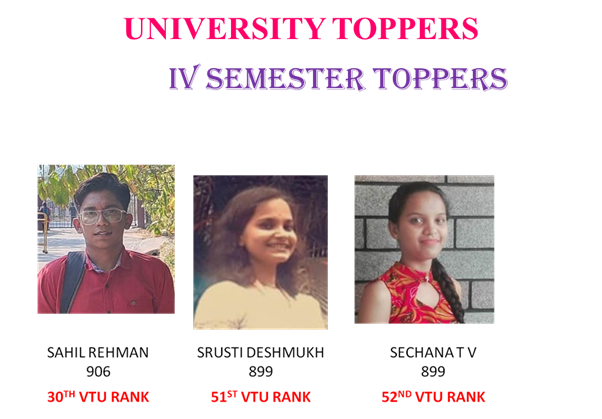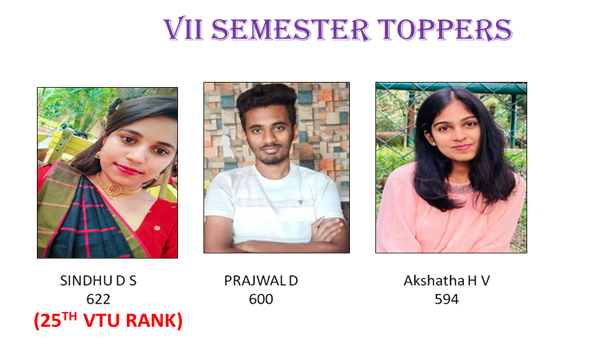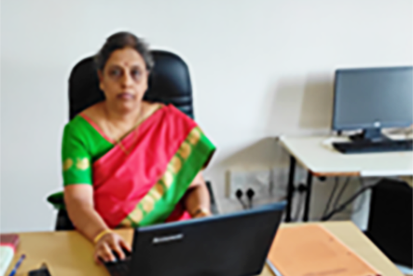Department of Artificial Intelligence and Machine Learning
Brief Profile
Department of Artificial Intelligence and Machine Learning was established in the year 2020 and is approved by AICTE and VTU. The department offers an undergraduate B.E program with an intake of 60 students. The intake has been increased to 90 in the year 2024. The department has well qualified teaching faculty with research, teaching and industrial experience. The department has state-of-art laboratories. The program is designed by VTU and electives are offered to provide hands-on and advanced knowledge in the field of Artificial Intelligence and Machine Learning. The Department offers all aspects of experiential learning as prescribed by Visvesvarya Technological University, Belagavi. The course curriculum is in line with the latest technology needed to the industry in both Computer Science and Engineering and Artificial Intelligence. The students of Artificial Intelligence and Machine Learning students have secured semester ranking in VTU and are recruited in reputed companies.
Good Practices
- Motivating students with curricular and extra-curricular activities.
- Remedial coaching classes for slow learners.
- Students and Faculties are encouraged with financial assistance to take up MOOCs courses.
- Value added programs.
- Improving technical skills by arranging workshops, seminars, internships,.
- Industrial visits.
- Recognition and team work.
- Inculcating Leadership qualities.
- Mentoring System.
Vision

To achieve quality education in the field of Artificial Intelligence and Machine Learning focusing on fundamentals, innovation and research.
Laboratory Details
Ø Artificial Intelligence Lab
Ø Machine Learning Lab
Ø Analysis and Design of Algorithms Lab
Ø MongoDB Lab
Ø UI/UX Lab
Ø Natural Language Processing Lab
Ø Data Base Management System Lab
Ø Data Structure Lab
Ø Digital Design and Computer Organization Lab
Ø Data Visualization Lab
Ø Operating System Lab
Ø Networks Lab
Mission

- To provide students with strong fundamentals in the field of Artificial Intelligence and Machine Learning.
- To impart professional ethics, leadership qualities and a determination to succeed in life.
- To impart rigorous training to enhance the knowledge through interdisciplinary concepts and technologies related to Artificial Intelligence and Machine Learning.
- To encourage innovation and enhance research in emerging areas by collaborating with industries and institutions.
Short Term Goals
- Improve academic performance with Next-Gen Technologies, Generative AI and Prompt Engineering.
- Organize Seminars/workshops/faculty development program/student development program.
- Publish research papers.
Program Specific Outcomes (PSOs)
PEO1 :Analyze the real world problem and Apply creative ideas to solve the real-world problems using Artificial Intelligence and Machine Learning techniques.
PEO2: The graduates develop technical skills to deal with the industry requirements.
PEO3: Pursue Higher studies and contribute towards research in the field of Artificial Intelligence and Machine Learning.
Long Term Goals
- Establish research centre.
- Industry collaboration.


Program Education Objectives (PEOs)
PEO1 :Analyze the real world problem and Apply creative ideas to solve the real-world problems using Artificial Intelligence and Machine Learning techniques.
PEO2: The graduates develop technical skills to deal with the industry requirements.
PEO3: Pursue Higher studies and contribute towards research in the field of Artificial Intelligence and Machine Learning.
PROGRAM OUTCOMES
Engineering Knowledge: Apply the knowledge of mathematics, science, engineering fundamentals, and an engineering specialization to the solution of complex engineering problems.
Problem Analysis: Identify, formulate, research literature, and analyze complex engineering problems reaching substantiated conclusions using first principles of mathematics, natural sciences, and engineering sciences.
Design/DevelopmentofSolutions:Designsolutionsforcomplexengineeringproblems and design system components or processes that meet the specified needs with appropriate consideration for the public health and safety, and the cultural, societal, and environmental considerations.
Conduct Investigations of Complex Problems: Use research-based knowledge and researchmethodsincludingdesignofexperiments,analysisandinterpretationofdata,and synthesis of the information to provide valid conclusions.
Modern Tool Usage: Create, select, and apply appropriate techniques, resources, and modernengineeringandITtoolsincludingpredictionandmodelingtocomplexengineering activities with an understanding of the limitations.
The Engineer and Society: Apply reasoning informed by the contextual knowledge to assesssocietal, health, safety, legal and cultural issues and the consequent responsibilities relevant to the professional engineering practice
Environment and Sustainability: Understand the impact of the professional engineering solutions in societal and environmental contexts, and demonstrate the knowledge of, and need for sustainable development.
Ethics:Applyethicalprinciplesandcommittoprofessionalethicsandresponsibilitiesand norms of the engineering practice.
Individual and Team Work: Function effectively as an individual, and as a member or leader in diverse teams, and in multidisciplinary settings.
Communication: Communicate effectively on complex engineering activities with the engineering community and with society at large, such as, being able to comprehend and write effective reports and design documentation, make effective presentations, and give and receive clear instructions.
Project Management and Finance: Demonstrate knowledge and understanding of the engineering and management principles and apply these to one’s own work, as a member and leader in a team, to manage projects and in multidisciplinary environments.
Life-LongLearning:Recognizetheneedfor,andhavethepreparationandabilitytoengage in independent and life-long learning in the broadest context of technological change.
Head of the Department

Dr.Shaila K
BE(Electronics), M.E (Electronics and Communication Engineering, Ph.D (Computer Science and Engineering)
Professor & HOD
Email ID :dr.shailak.aiml@gmail.com
Mobile : 9964579958
Dr. Shaila K, is presently the Head of the Department of Artificial Intelligence and Machine Learning. She has over 27 years of teaching experience and 16 years of research experience. She was Professor and Head of the Department of Electronics and Communication Engineering, Vivekananda Institute of Technology from May 2012 till June 2019 and Placement Officer from 2021 till 2023. She has obtained multidisciplinary degree with Ph. D in Computer Science and Engineering, University Visvesvaraya College of Engineering from Bangalore University, M.E in Electronics and Communication from University Visvesvaraya College of Engineering, Bangalore University and B.E in Electronics from PES Institute of Technology, Bangalore University, Bangalore. She has authored the book titled Digital Circuits and Systems published by Tata McGraw Hill, New Delhi and Secure Data Communication Techniques by LAP LAMBERT publishers, Germany, Secure Routing in Wireless Sensor Networks published by TechSar. She has guided five Ph.D scholars and one scholar is pursuing Ph.D in VTU. She has 70 papers in refereed International Journals and 68 papers in International Conferences to her credit. She has received Best Teacher and Best Researcher Award. She has received Best Project award and received grant from AICTE for her research work. She has obtained the star performer from NPTEL. She has been invited from colleges to deliver the talk. Her name appears in Marquis Who’s Who in the World Science and Engineering. She has been the reviewer and chaired Technical sessions in various International conferences. She has organized Internationl Conferences and various events. She is the Life member of ISTE, iMAPs, Member of ACM, Member of IEEE, IEANG and reviewer for conference and journals. Her research interest includes Wireless Sensor Networks, Adhoc Networks, Internet of Things, Cyber Security, Artificial Intelligence, Deep learning, Natural Language Processing and Image Processing.
Distinguished Alumni










